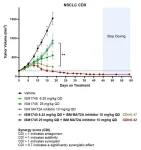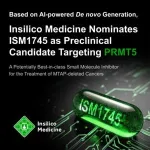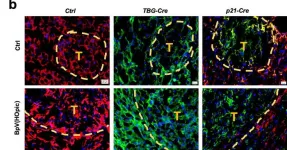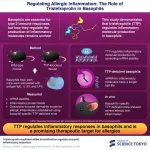(Press-News.org) Since 2021, Insilico Medicine has successfully nominated 22 preclinical candidates (PCCs) with the help of its proprietary Pharma.AI platform, among which 5 were nominated just the year of 2024.
The novel scaffold of ISM1745 is based on de novo generation results of Insilico’s Chemistry42, the generative AI platform combining more than 40 generative models.
With in vivo anti-tumor activity validated in multiple cancer models, the candidate compound showed robust in vivo efficacy as monotherapy as well as combination potential with chemotherapies, targeted agents including MAT2A inhibitor, and immunotherapies.
CAMBRIDGE, Mass., January 2, 2025 — Insilico Medicine (‘Insilico’), a clinical-stage generative artificial intelligence (AI)-driven drug discovery and development company, today announced the nomination of ISM1745, a potentially best-in-class MTA cooperative PRMT5 inhibitor with AI-powered novel scaffold, as preclinical candidate (PCC) for the treatment of MTAP-deleted cancers. Based on de novo design results of Chemistry42, ISM1745 marks the fifth PCC nomination achieved by the Insilico team in the year of 2024, bringing the total number since 2021 to 22.
Protein arginine methyltransferase 5 (PRMT5) regulates essential cellular processes, including RNA splicing, DNA damage repair, and translation, and elevated PRMT5 expression is observed in various cancers and correlates with poor prognostic outcomes. In MTAP-deleted tumor cells, the accumulating methylthioadenosine (MTA) increases sensitivity to PRMT5 inhibition, while binding with PRMT5 to form a novel MTAP-deleted cancer specific target, showing PRMT5’s potential as a synthetic lethality target.
"MTAP (methylthioadenosine phosphorylase) deletion occurs in about 15% of human cancers, with higher frequency in later line patients suffering from resistance to standard therapies, highlighting great unmet needs," said Feng Ren, PhD, Co-CEO and Chief Scientific Officer of Insilico Medicine. "The novel scaffold of ISM1745 powered by Chemistry42 enables unique interaction with the specific target for MTAP deleted cancers. With promising preclinical results, we look forward to further evaluation of ISM1745 as another Insilico AI-driven program."
Leveraging the structure-based generation strategy, Insilico scientists started with de novo molecule design outputs of Chemistry42, the AI-powered generative chemistry engine. After AI-supported molecule evaluation based on pharmacophores, druglikeness, developability and other factors, ISM1745 was selected as a preclinical candidate following rounds of optimization.
According to the preclinical data, ISM1745 demonstrated robust in vivo efficacy at a low dosage in multiple animal models, with promising potency as monotherapy and broad potential in combination with chemotherapies, targeted agents, and immunotherapies. The combination potential with MAT2A inhibitor has been validated in both in vitro and in vivo tests. Additionally, the compound shows excellent selectivity over MTAP WT cell lines, minimized drug-drug interaction (DDI) risk, and favorable Drug Metabolism and Pharmacokinetics (DMPK) profiles.
"As the fifth PCC nomination solely in 2024, the achievement further proves the reproducibility of Insilico's programs," said Alex Zhavoronkov, PhD, Founder and CEO of Insilico Medicine. "Since the foundation of Insilico in 2014, our Pharma.AI platform has been growing nonstop, from algorithms in the papers to the comprehensive AI toolbox today. We want to make sure that generative AI accelerates the costly and lengthy process of drug discovery and development, so more people could live longer and healthier lives."
In 2016, Insilico first described the concept of using generative AI for the design of novel molecules in a peer-reviewed journal, which laid the foundation for the commercially available Pharma.AI platform. Since then, Insilico keeps integrating technical breakthroughs into Pharma.AI platform, which is currently a generative AI-powered solution spanning across biology, chemistry, medicine development and science research. Powered by Pharma.AI, Insilico has nominated 22 preclinical candidates in its comprehensive portfolio of over 30 assets since 2021 and has received IND clearance for 10 molecules.
In early 2024, Insilico published a Nature Biotechnology paper presenting the entire R&D journey from AI algorithms to Phase II clinical trials of ISM001-055, the company's lead drug pipeline with AI-discovered target and AI-designed structure. Following that, Insilico has recently announced positive preliminary results from a Phase IIa trial (NCT05938920), where ISM001-055 showed favorable safety and tolerability across all dose levels, as well as dose-dependent response in forced vital capacity (FVC), after only 12 weeks of dosage.
About Insilico Medicine
Insilico Medicine, a global clinical stage biotechnology company powered by generative AI, is connecting biology, chemistry and clinical trials analysis using next-generation AI systems. The company has developed AI platforms that utilize deep generative models, reinforcement learning, transformers and other modern machine learning techniques for novel target discovery and the generation of novel molecular structures with desired properties. Insilico Medicine is developing breakthrough solutions to discover and develop innovative drugs for cancer, fibrosis, immunity, central nervous system diseases, infectious diseases, autoimmune diseases, and aging-related diseases.
www.insilico.com
END
Scientists at University of California San Diego School of Medicine have shed new light on the development of liver cancer, the sixth most frequently diagnosed cancer and fourth leading cause of cancer deaths worldwide. The study, published in Nature, reveals a complex interplay between cellular metabolism and DNA damage that drives the progression of fatty liver disease to cancer. The findings suggest new paths forward for preventing and treating liver cancer and have significant implications on our understanding of cancer’s origin and the effects of diet on our DNA.
The incidence of the most common form of liver cancer, hepatocellular carcinoma (HCC), has grown by 25-30% in the past ...
Inflammation is a crucial part of the body’s defense mechanism, playing a key role in fighting infections and repairing tissue damage. Basophils, a type of immune cell that makes up less than 1% of white blood cells, have recently emerged as critical players in triggering allergic responses by releasing pro-inflammatory cytokines like IL-4. Despite the established role of basophils in inflammation, the molecular mechanisms controlling their cytokine production have remained unclear.
To address this gap, a group of researchers from Institute of Science Tokyo, led by Professor Kensuke Miyake, conducted a study to explore the role of tristetraprolin ...
Researchers are aiming to bring the magic of playing music in person to the virtual world.
The Joint Active Music Sessions (JAMS) platform, created at the University of Birmingham, uses avatars created by individual musicians and shared with fellow musicians to create virtual concerts, practice sessions, or enhance music teaching.
Dr Massimiliano (Max) Di Luca from the University of Birmingham explains: “A musician records themselves and sends the video to another musician. The software creates a responsive avatar ...
One or two doses of psilocybin, a compound found in psychedelic mushrooms, may improve the mental health of cancer patients when accompanied by psychotherapy, a new report suggests. A second new study found that treatment with psilocybin resulted in lasting, positive personality changes in patients with alcohol use disorder.
The first report’s findings were published online Oct. 7 in the journal Nature Mental Health, and the second published online Jan. 1 in a special edition of The American Journal of Psychiatry focused on psilocybin research.
In the first study, a team of experts at NYU Langone Health found that psilocybin accompanied by psychotherapy significantly reduced anxiety, ...
To many, Vice President Kamala Harris’s loss in the 2024 presidential election was a sobering reminder of a larger and continuous gender gap across leadership positions in not only government, but also in business, higher education, and the military. A majority of Americans recognize the inadequacy of female representation in leadership, and the news media often portray women’s underrepresentation in these roles—but it nonetheless persists.
Recognizing that news coverage may have influence in forming attitudes and in driving ...
A new international study led by researchers at Karolinska Institutet in Sweden shows that AI-based models can outperform human experts at identifying ovarian cancer in ultrasound images. The study is published in Nature Medicine.
“Ovarian tumours are common and are often detected by chance,” says Professor Elisabeth Epstein at the Department of Clinical Science and Education, Södersjukhuset (Stockholm South General Hospital), at Karolinska Institutet and senior consultant at the hospital’s Department of Obstetrics and Gynecology. “There is a serious shortage of ultrasound experts in many parts of the world, which has ...
Researchers from the Bakkers group at the Hubrecht Institute have successfully repaired damaged mouse hearts using a protein from zebrafish. They discovered that the protein Hmga1 plays a key role in heart regeneration in zebrafish. In mice, this protein was able to restore the heart by activating dormant repair genes without causing side effects, such as heart enlargement. This study, supported by the Dutch Heart Foundation and Hartekind Foundation, marks an important step toward regenerative therapies to prevent heart failure. The findings were published in Nature Cardiovascular Research on January 2, 2025.
After a heart attack, the human heart loses millions of muscle cells that cannot ...
Artificial intelligence tools such as ChatGPT have been touted for their promise to alleviate clinician workload by triaging patients, taking medical histories and even providing preliminary diagnoses.
These tools, known as large-language models, are already being used by patients to make sense of their symptoms and medical tests results.
But while these AI models perform impressively on standardized medical tests, how well do they fare in situations that more closely mimic the real world?
Not that great, according to the findings of a new study led by researchers at Harvard Medical School and Stanford University.
For their analysis, published Jan. 2 in Nature ...
Fighting cancer can seem like a deadly game of chance. While some patients may respond well to certain treatments, others might not be as fortunate. Doctors and scientists have long struggled to explain why. Now, Cold Spring Harbor Laboratory (CSHL) Assistant Professor Katherine Alexander and University of Pennsylvania Professor Shelley Berger have found a possible source of this variability in clear cell renal cell carcinoma (ccRCC)—the most common kidney cancer diagnosed in adults.
Alexander ...
Hula hooping is so commonplace that we may overlook some interesting questions it raises: “What keeps a hula hoop up against gravity?” and “Are some body types better for hula hooping than others?” A team of mathematicians explored and answered these questions with findings that also point to new ways to better harness energy and improve robotic positioners.
The results are the first to explain the physics and mathematics of hula hooping.
“We were specifically interested in what kinds of body motions and shapes could successfully hold the hoop up and what physical requirements and restrictions are involved,” explains ...







